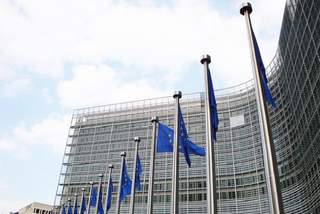
EU-Commission in Brussels © Jai79/Pixabay
International Public Procurement: New Opportunities for the EU?
In 2010, the debate in the EU intensified regarding whether access to the European public procurement market should be made dependent on the degree of openness of other countries. In order to level the playing field and ensure fair competition, the European Commission then proposed an EU regulation on market access in public procurement in 2012, subsequently also called the International Procurement Instrument (IPI). In light of some considerable shortcomings of the proposal and strong opposition from several Member States including Germany, the Commission presented a revised proposal in January 2016.
The proposal comprises a procedure of three steps: first, the Commission launches a public inquiry into possible discrimination against European companies in the public procurement market of a third country. Next, the Commission is to start discussions with the country concerned on more market access, if the public inquiry identifies discriminatory practices. Finally, the Commission may – but only as a last resort – impose a price penalty on tenders from the country in question, of which at least 50 percent consist of goods and services from the country in question. This would mean that the respective offer would have to be treated as if its price was 20 percent higher than the nominal price of the bid. These rules of the Commission proposal would cover public procurements from a specific IPI threshold of 5 million Euros. Nevertheless, the amended proposal of the Commission also contains some elements which received controversial comments, ultimately leading to a stalemate in the Council.
In March 2019, the European Commission stressed the importance of the instrument in balancing competitive conditions with major economic powers such as China. The Commission therefore urged the Council and the European Parliament to adopt the IPI proposal of 2016 as soon as possible. Meanwhile many Member States, in part also including those, like Germany, that were against the proposal, support a revitalisation of the discussion on the IPI, whereby they ask for further amendments. One main reason for the change of mind is the growing sentiment that some prominent third countries like China are “systemic competitors,” which do not intend to open up their own markets for EU businesses.
Furthermore, state-owned enterprises from such third countries are becoming increasingly active in the European market, often submitting tenders with very low, potentially dumped prices. The legislative process on the IPI is still in the first stage. In autumn 2019, the Council once again restarted discussions on the IPI, based on the amended commission proposal of 2016. However, it is near certain that the Council will request further amendments. While the Commission has called for the proposal to be finalised by the close of 2019, this will likely not be reached until early 2021.
Necessary Adjustments
The IPI pursues the right objective of open markets and enforcing the principle of balanced reciprocal market access enshrined in the Government Procurement Agreement (GPA) of the WTO. Thus, the BDI essentially welcomes that the IPI enables the Commission to initiate formal investigations in cases of discrimination against EU companies in third countries and to launch consultations with them.
However, even the Commission’s amended IPI proposal requires further revision to avoid negative impact on the procurement process. Excessive bureaucratic burden for companies, legal uncertainties and risks for EU companies, as well as contracting authorities in the EU, must be avoided.
At the same time, the leverage effect towards third countries needs to be increased; for example, through more effective sanctions. For example, BDI considers the envisaged price adjustment measures of up to 20 percent for bidders from closed countries to be insufficient. Experience has shown that offers from third-country bidders have often been around 25 percent lower than the next offer. Accordingly, it should be stipulated that the price adjustment measure may also reach up to more than 20 percent. Furthermore, it should be possible to completely exclude bidders in cases of major offenses from the side of the respective third country. The aim must always be to persuade third countries to open up their procurement markets and to abstain from unfair practices on EU markets.



